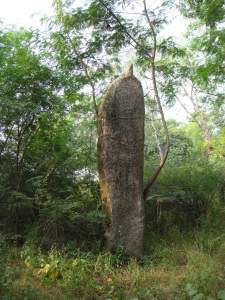As education gets increasingly professionalized and compartmentalized, it often takes great effort to argue for a generalist approach. Very serious and well-meaning educationists will make a strong case for focussed teaching within a curriculum- Course A to follow Course B, dropping Course C because that can be picked up easily and introducing Course D because thats “hot” these days, and so on. (Depending on the discipline and the degree, you can easily put in appropriate names for A, B, C, and D.)
 With the changing landscape of education, its sometimes worth thinking whether there is enough freedom of choice in our programs, and whether some students might benefit from a more generalist framework where less would be prescribed (or proscribed, for that matter) and the student could more actively participate in her or his own curriculum.
With the changing landscape of education, its sometimes worth thinking whether there is enough freedom of choice in our programs, and whether some students might benefit from a more generalist framework where less would be prescribed (or proscribed, for that matter) and the student could more actively participate in her or his own curriculum.
I can’t see that happening in a hurry, but I think that the higher education scenario is changing sufficiently that one must give this some serious consideration. Two immediate catalysts for the present observation were a visit by two students of the present first year batch in the CIS, and a podcast I heard.
First the students. Basically they came to share their observations that when they compared the curriculum of the five-year program at UoH with that at other institutions where there are similar five-year programs, ours seemed to be much simpler and not really challenging. In some sense, this is not too surprising given that the IISERs and other institutions cater to smaller numbers and offer a specialized if limited smörgåsbord of curricular possibilities. But I think we should pay some heed to a serious comment from the end-users, so to speak. Our courses should be accessible, but not at the cost of making them not challenging enough. (As Einstein famously said, “Make things as simple as possible, but not simpler.” ) Having been in a similar boat many years ago, another case of syllabus envy I guess, I tried to tell the lads to also take responsibility for their own education and learn from their peers across the country- but that is easier said than done. So should our curriculum be deeper or wider? And how can we tailor it to those who want to go faster? Or, for that matter, slower?
I was mulling over this and related questions when I heard an interview with philosopher Tim Crane of Cambridge University on whether animals (other than humans) have minds? (This is one of the brilliant Philosophy Bites podcasts by David Edmonds and Nigel Warburton.) The discussion was on how philosophers think we think, on how we define thinking, consciousness, and so on, and whether animals have “a theory of mind” and how this relates to our own theory of mind.
One thing that struck me- enough that I came back to this interview several times- was the deep connection between the fact of having language and the ability to imagine having a mind. Crane says- and I paraphrase- that what sets apart human thought from animal thought is our ability to think about things without thinking about their practical consequences. The pursuit of truth for its own sake is a characteristic of human thinking and, further, that it is an evolutionary adaptation that gave us the ability to learn things without there having to be an immediate use. And that this gave us an enormous advantage in the development of culture.
This is worth thinking about. Some laterality, even in structured programs of instruction, is clearly worth having, perhaps at the cost of some depth. And if this can bring about a culture of thinking, so much the better. But above all, the link is language.
Elsewhere in the interview Crane has occasion to say that philosophy starts at the boundaries of science- in this particular case, our inability to know how or whether animals think leads us to examine more closely our own concepts of belief and thought.
And this is a good thing to remember, that not only are the boundaries among the sciences blurred, at some level, even the boundary between the sciences and philosophy is. (Not for nothing was the study of science termed natural philosophy in earlier days!) What we have at the UoH is the possibility of bringing to our integrated programs of study in the CIS a diversity that only a University can provide. This is an advantage we should exploit to its fullest.
 Walkabout refers to a rite of passage during which male Australian Aborigines would undergo a journey during adolescence and live in the wilderness for a period as long as six months when they would trace the paths or “songlines” that their people’s ceremonial ancestors took, and imitate, in a fashion, their heroic deeds. The songline here is the path along Gurbaksh Singh Wall, going past the UoH menhir where our prehistoric ancestors lived.
Walkabout refers to a rite of passage during which male Australian Aborigines would undergo a journey during adolescence and live in the wilderness for a period as long as six months when they would trace the paths or “songlines” that their people’s ceremonial ancestors took, and imitate, in a fashion, their heroic deeds. The songline here is the path along Gurbaksh Singh Wall, going past the UoH menhir where our prehistoric ancestors lived.









